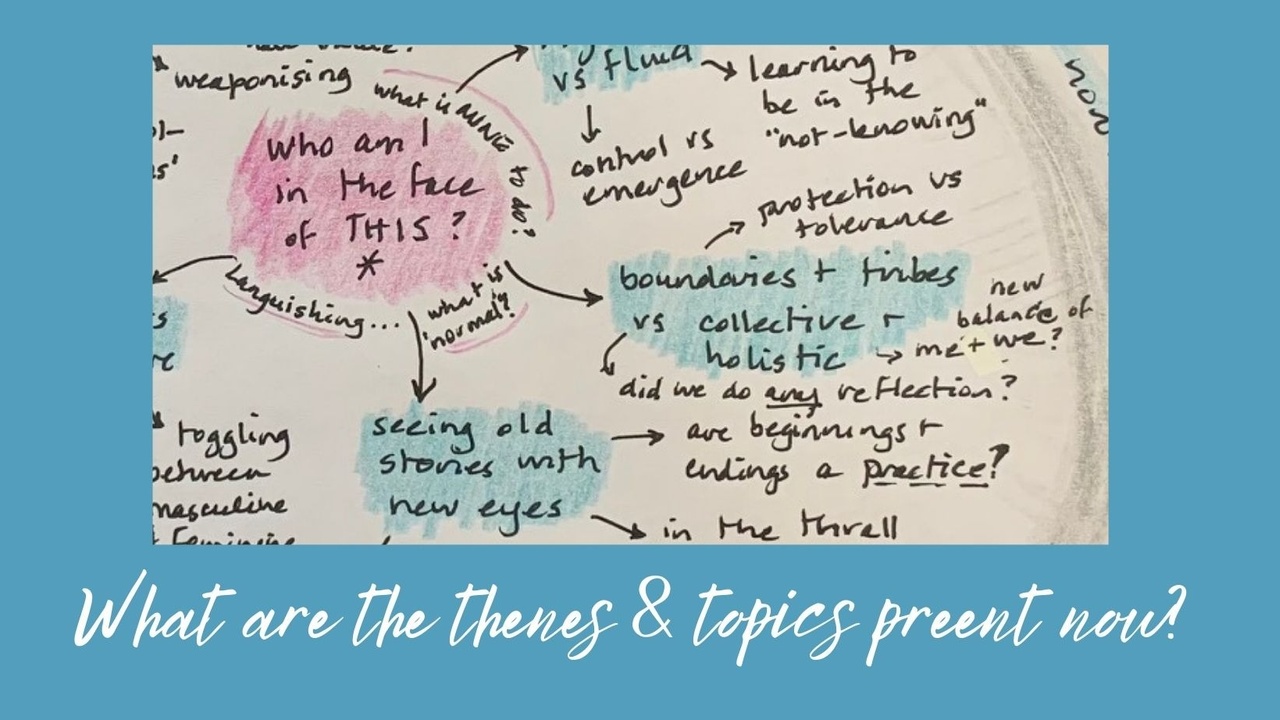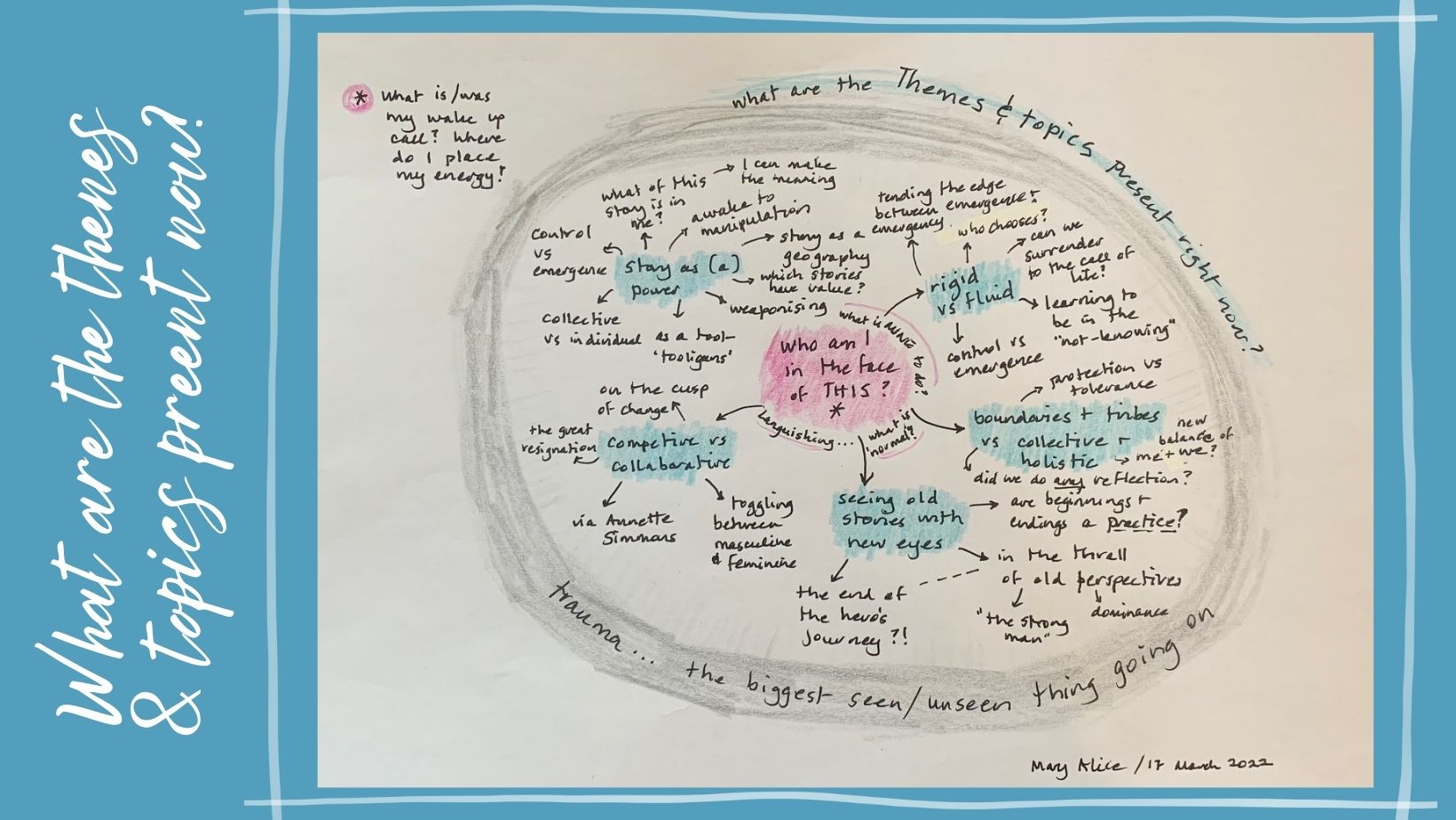A closer look at the present moment
Mar 18, 2022
Yesterday I had the great pleasure to check in with a group of storymakers I haven't seen in a long time. Most of them are part of Beyond Storytelling, a network of story people which hosts an annual "Story Camp", this year taking place in Austria.
The theme for this year is "Beginnings & Endings" and they were gathering to prepare the ground for the small book they produce annually called "a reader." The check in question was quite simple, really: "What are the themes and topics present now?" I was surprised how much a three minute journalling raised in me. This is my harvest.

For me, at the very center -- you might call it the "epicenter" since this time in history has felt like a series of deep and profound earthquakes -- sits a fundamental question so many of us have been asking ourselves:
Who am I in the face of this?
We've faced languishing over the pandemic years. We've realised "normal" isn't all it was cracked up to be and yet we still long for it. We are asking ourselves: "What is mine to do?" And as one participant in the group said: "When the war in Ukraine started, I realized I'd had a profound wake up call. It feels urgent to consider where I place my energy now."
And then I recorded five key themes.
Theme 1: RIGID VS FLUID
We've already been in the impact of this inquiry (and for many an intense conflict) in many different ways. Consider how our young people are asking us to think about gender. They are modelling that gender is not a polarity, it is a continuum. Think about the divisions around vaccination. What about the movement of people around. the world? What about politics?
So many of us have been so off balance that we are trying anything to get back in control. As one person in the group said: "I'm used to knowing how the story will end. But now I can't see it. My own life threatening illness upended my life." All of us have now had this kind of experience in our relational networks.
I get the sense life is asking us to be even more adaptable, more fluid, more soft. It is challenging us to befriend the "not knowing" and to surrender. Boy is that hard! How do we tend to the edge between emergence and emergency?
Theme 2: BOUNDARIES & TRIBES VS COLLECTIVE & HOLISTIC
Think of all those movies where the aliens invaded and the Earth banded together to defend itself. It feels like that happened. The impact was immediate and life-threatening. The casualties immense. Only the invader was unseen. And we didn't band together, we fell into tribes and factions. We warred against each other. Our COVID story is symptomatic of the storyline we find ourselves in.
So did we use this time wisely and any reflection at all? I'm still wondering about that. And I'm including myself here. What is the new balance between ME and WE? What changes need to be made in our human storyfield to enable us to live better together?
Theme 3: COMPETITIVE VS COLLABORATIVE
We can all feel the cusp of change as our institutions, frameworks and habituated ways of thinking got tossed into the spin cycle. The "Great Resignation" is a symptom of a wider malaise. I find Annette Simmons' work on the differences in how men and women story around power very illuminating.
Women so often tell collaborative narratives, and yet our institutions and power structures are set up to value competitive narratives. We see one playing out right now in Eastern Europe. How can we learn to toggle back and forth between these two kinds of narratives for the benefit of life and us all? My sense is we better get better at this NOW.
Theme 4: SEEING OLD STORIES WITH NEW EYES
When it comes to stories, we are still in the thrall of old perspectives. Most of our "classical" favourite stories are following the hero's journey pattern. Women, as renowned folklorist Maria Tatar points out in her latest work, show up as passive and two dimensional, when they even show up at all. We have valued the strong man, dominance and "the glory of battle." Meanwhile 50% of the world have not shown up in this pattern, and 99% do the work that benefits the top 1%. We have all have paid for this myopia.
And in the context of this particular conversation we talked about the way language makes "beginning" and "end" sound like two separate things, and yet they are like a yin/yang. The seeds of each is in the other. So I wondered... Are beginnings and endings a practice? Are they a life practice? Certainly all great spiritual practices would tell us so.
Theme 5: STORY AS (A) POWER
This is a big one for me, since it is at the heart of my personal work focus. There are many potential sub-themes, but here are a few:
Stories have always been weaponised. It's just that we are seeing it ever more clearly. Especially in light of a "propaganda" war, but this way of manipulating story has also been called (and practiced in the country I live in as) "fake news." The bottomline in this way of working is repeating something so often that most people start to believe it. Very often it is couched as a single true story. As we become ever more awake to manipulation, we see it at finer and finer levels.
The current consumer culture began post WWII as a way to get people to keep the economy going once war was no longer the focus. Where before one something (a refrigerator, car, house, boat, winter coat) was enough, advertising was created to stimulate a hunger for "more." It has become the predominant storyline. This hunger has been turned upon us to create the cultural story that we can never be enough. We will never be beautiful enough, creative enough, intelligent enough, famous enough, rich enough, safe enough for this world.
The result has been cancel culture, the mental suffering of millions, the loss of so many young lives through suicide, addiction, homelessness, acts of group violence and all the "isms" you can name. The millions of tiny micro aggressions that act like paper cuts to the soul until it bleeds out.
Though beginning of the words "hostile" and "hospitality" appear to be similar, their impact is categorically different. I remember a friend who volunteered on the Syrian refugee trail through Europe in 2015. He was amazed at how hospitable those refugees were. They had almost nothing and yet they were willing to share everything. And that made all the difference. There is a story of hospitality going on right now in countries bordering the Ukraine. It is our natural, human response to crisis. It is one of the deepest stories we know.
And yet, which stories have value? Whose stories have value? How do we assign value? Once again the theme of control versus emergence raises its head, once again we are in the dance of individual versus collective. We are learning this is not an or decision, it is an and. How do we widen our gaze to include the stories of all, especially those who have not shown up in the dominant narrative, those who are sidelined, silenced or scapegoated?
The call to be awake to stories comes home to each of us. This is about personal empowerment. While a whole field of practitioners have named story as a "tool" (my story colleague Jacques Chlopzyck calls those over addicted to methodologies "tooligans") it is also our intrinsic human superpower. That means we have a personal stake in what happens to it -- and consequently to us.
WE are the ones who can make sense and meaning for ourselves. WE are the ones who can be intentional with the words we use, the stories we tell and the meanings we allow to live rent free in our heads. And we can continue to practice self-awareness and compassion and ask ourselves: "What of this story is in me? How am I part of this thing I want to complain about? How have I, too ,been like this fill in the blank...(judgemental, abusive, naive, violent, uncaring, blind, foolish, you name it)?"
These practices are fundamental in taking back the power of our own stories so they can act as a core to authentic curiosity, a rudder in times of turbulence and a reminder of who we choose to be despite what is happening.
And all of this, for me, is happening within the field of TRAUMA.
None of us are exempt, now that all of us have been through COVID. Whatever other traumas we have experienced in life are triggered and rise to the surface because of this new trauma. And, as the science of epigenetics tell us, all of the ancestral trauma we carry through our family experiences, bloodlines and DNA is also in play, in and through us.
Trauma is the biggest seen/unseen thing happening right now in the foreground for some and the background of all others. It is. the biggest storyline we need to turn and face if we are to move into a new future together. It takes resilience, practice and individual and collective practice. This makes the work of Thomas Hübl, Gabor Maté, Bessel van der Kolk and so many others so vitally important right now.
Is there light at the end of the tunnel?
With all of this, is there any good news? YES! Since story belongs to all of us, all of us can work with it. There are many and varied ways -- enough for every person to choose something. Get a copy of my book. Get a copy of any other story book. Attend a workshop. Join me on my workshop.
Get curious. Get personal. Get aware. Get moving.
The change starts with story. It starts with you.
Isn't it time to have a brilliant ally on your side?
Subscribe to my newsletter for the latest about the power & practice of story.
We hate SPAM. We will never sell your information, for any reason.
